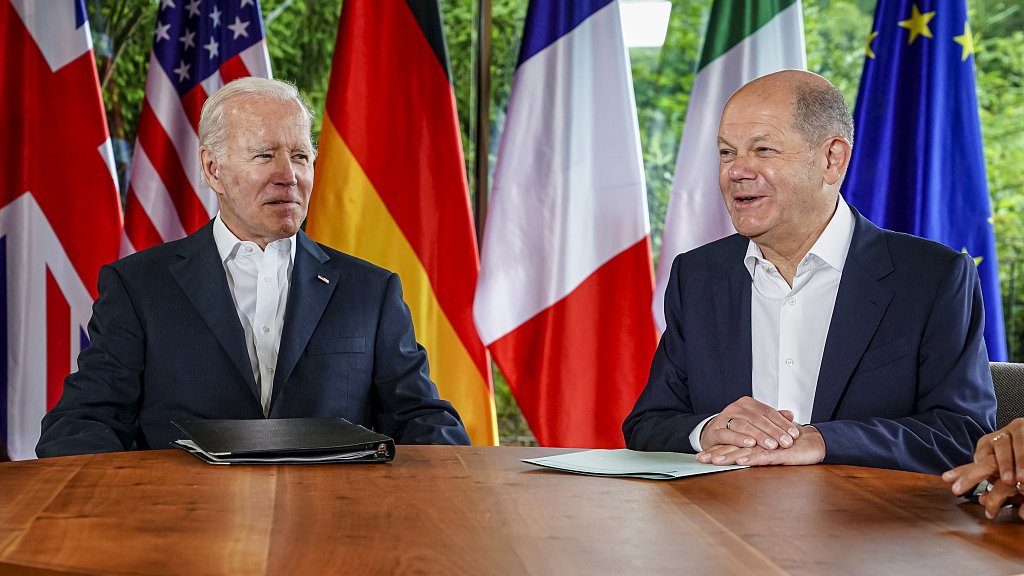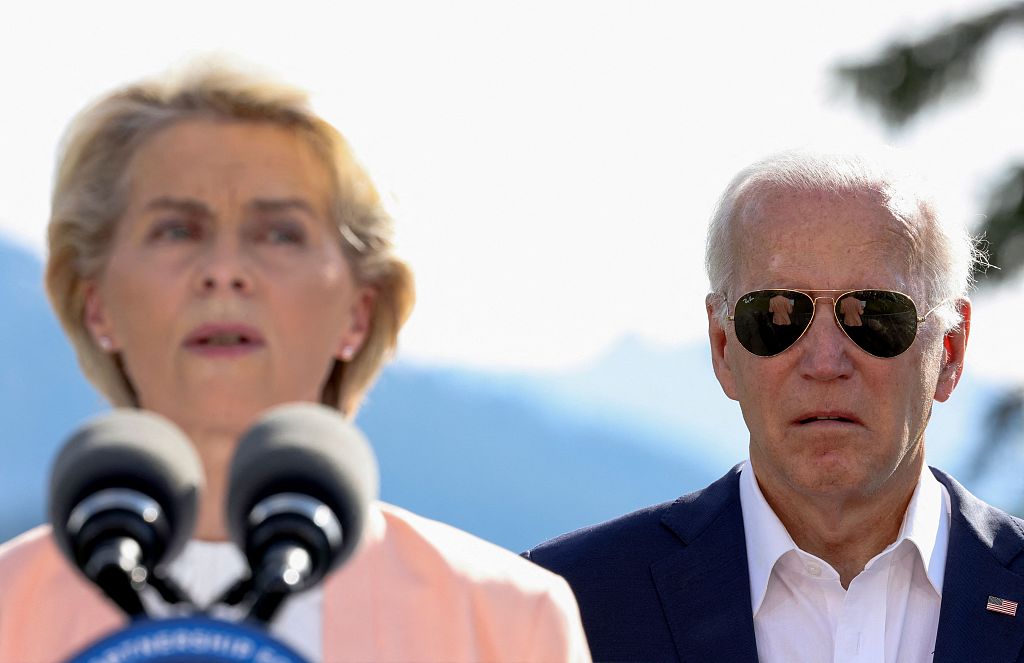
U.S. President Joe Biden (L) and German Chancellor Olaf Scholz (R) chat before meeting with other G7 leaders at Elmau Castle near Garmisch-Partenkirchen, Germany, on June 28, 2022. /CFP
U.S. President Joe Biden (L) and German Chancellor Olaf Scholz (R) chat before meeting with other G7 leaders at Elmau Castle near Garmisch-Partenkirchen, Germany, on June 28, 2022. /CFP
Editor's note: Huang Yongfu is an economic affairs commentator. After earning a PhD, he started his career at the University of Cambridge and then moved on to the UN system. His current interests lie in global development and Sino-U.S. links. The article reflects the author's opinions and not necessarily the views of CGTN.
At the recent G7 Summit in Germany, U.S. President Joe Biden announced an ambitious infrastructure plan, the Partnership for Global Infrastructure and Investment (PGII), calling on G7 leaders to raise $600 billion over the next five years to finance infrastructure construction in developing countries across the globe.
The press release from the G7 Summit framed the PGII as a policy response to counter China's Belt and Road Initiative (BRI). Viewing BRI via a geopolitical prism, the U.S. is using the PGII to check China's global influence by offering an "alternative" to the BRI.
Yet what's glaringly absent from Washington's attempts to reshape a world order are its efforts to lay claim to a moral or cultural authority. The U.S. has made it very obvious that they are chasing after cold hard cash and engaging in military posturing.
COVID-19 casts lingering doubts over U.S.'s commitment to PGII
Since the emergence of COVID-19, the U.S. has pledged to donate over one billion vaccine doses to developing countries that have gotten hammered by COVID-19. Despite many of those countries remaining in desperate need of vaccines, Washington has failed to fulfill its promise on vaccine distributions for them, even though more than half a billion surplus vaccines are still left over, on top of securing sufficient doses to protect its entire U.S. population of 330 million.
In sharp contrast to the U.S.'s empty promises, the Chinese government has filled the gap and has contributed succesfully to combatting COVID-19 worldwide, by providing more than 2.2 billion doses of COVID-19 vaccines to more than 120 countries and international organizations.
So it's time to ask the tough questions. Can Biden keep his promise on his infrastructure plan, designed to replace BRI? How will the U.S. convince those low- and middle-income countries that his pledge will be honored, even though people from the developing nations have felt frustrated over the U.S.'s prior failure to deliver COVID-19 vaccines to them?
Rebranding green projects under Paris Climate Accord
According to media reports, the PGII projects are aimed at "tackling climate change," along with upgrading global health, gender equality and digital infrastructure. To ask developing countries to shut down their coal plants, the so-called Just Energy Transition Partnerships is being rolled out in South Africa, and possibly in India, Indonesia, Vietnam and Senegal. Biden has highlighted a flagship project of building a $2 billion solar plant in Angola, commissioned by the U.S. Commerce Department with direct financing from the U.S. Export-Import Bank, U.S.-based firm Africa Global Schaffer and U.S. project developer Sun Africa.
Nonetheless as required by the Paris Accord on Climate Change of 2015, developed nations have obligations to deliver $100 billion a year before 2020, now extending to a 2025 timeline, to help developing nations' mitigation of and adaptation to climate change.
The planned PGII projects involve numerous green infrastructure schemes in poor countries that were already promised as part of the Paris Accord of 2015.

European Commission President Ursula von der Leyen is seen next to U.S. President Joe Biden as she addresses a press conference with other G7 and EU leaders during the G7 Summit at Elmau Castle, southern Germany, June 26, 2022. /CFP
European Commission President Ursula von der Leyen is seen next to U.S. President Joe Biden as she addresses a press conference with other G7 and EU leaders during the G7 Summit at Elmau Castle, southern Germany, June 26, 2022. /CFP
To push developing nations into debt traps
For years, Western officials, especially those from the incumbent superpower, have maliciously claimed the BRI investments are either – incompetent, inefficient or predatory. They add that BRI projects are allegedly burdening developing countries with debt traps, and then they counter with an explanation that BRI projects are already doomed to fail. For example, America's National Security Strategy lashes out at the BRI as "predatory economics" and that to borrow money from China is to fall into a well-laid trap.
Biden has repeatedly said the PGII "isn't aid or charity," "an investment that will deliver returns for everyone." If this is true, how is it not different from China's BRI? Actually, the money handed to the developing nations would come either in the form of loans or investments. Therefore, PGII projects will get developing countries into terrifying debt traps as well. Apparently, Western officials are slapping themselves in the face in their efforts to contain China's rise.
To subvert the regimes of developing nations
To distinguish the PGII from China's BRI, Biden has claimed that there are political and ideological differences by insisting the PGII comes from "democratic countries," or claims like "we are offering better options for people around the world," it's better to take assistance from them than from "autocrats," and "the scheme would allow countries to see for themselves the concrete benefits of partnering with democracies."
To achieve their political, ideological and foreign policy objectives, Western donors have routinely imposed their values or attached conditions onto the projects, such as requiring the recipient nations comply with U.S.-led rules on human rights, democracy and freedom. By alleging human rights abuses, forced labor, unfair trade practices, genocide, and state subsidies Western donors are making common excuses to interfere in internal affairs and even to overthrow regimes of host countries.
But let's reflect more on the BRI. Having been smooth sailing for nearly a decade, the BRI's objective is not geopolitical scheming, but to enhance development. Therefore no conditions are attached to the related projects.
To foster a digital iron curtain that divides the world
As the other G7 countries are aware of PGII's political aim to contain China, they appear leery, partly on account of those countries holding deep economic ties with Beijing and stand reluctant to risk their huge trade investments deals just for Washington's benefit.
While developing countries might welcome having more options on the table, they do not relish feeling compelled to choose between the historical global power and the ascendant one, or to fall on one or the other side of a digital iron curtain that divides the global trading system.
According to a recent Chatham House report, the G7's geopolitical and geostrategic mindsets on infrastructure investment in the developing world "risk a further shift in development policy towards bilateralism and fragmentation within the G7 and with recipient nations."
(If you want to contribute and have specific expertise, please contact us at opinions@cgtn.com. Follow @thouse_opinions on Twitter to discover the latest commentaries in the CGTN Opinion Section.)

